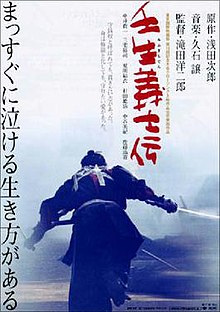When the Last Sword Is Drawn
| When the Last Sword Is Drawn | |
|---|---|
 Theatrical poster for When the Last Sword Is Drawn (2003) | |
| Directed by | Yōjirō Takita[1] |
| Written by | Jiro Asada (story) Takehiro Nakajima |
| Produced by | Nozomu Enoki Hideji Miyajima |
| Starring | Kiichi Nakai Kōichi Satō Yui Natsukawa Takehiro Murata |
| Cinematography | Takeshi Hamada |
| Edited by | Nobuko Tomita |
| Music by | Joe Hisaishi |
| Distributed by | Shochiku |
Release date |
|
Running time | 137 minutes |
| Country | Japan |
| Language | Japanese |
| Budget | $4,000,000[2] |
| Box office | $2,487,338[3] |
When the Last Sword Is Drawn (壬生義士伝, Mibu Gishi Den) is a 2002 Japanese movie directed by Yōjirō Takita loosely based on real historical events. When the Last Sword Is Drawn won the Best Film award at the 2004 Japanese Academy Awards, as well as the prizes for Best Actor (Kiichi Nakai) and Best Supporting Actor (Kōichi Satō). It received a further eight nominations.[4]
Synopsis
The film tells the story of two Shinsengumi samurai. One of them is Saitō Hajime (played by Kōichi Satō), a heartless killer and the other is Yoshimura Kanichiro (played by Kiichi Nakai), who appears to be a money-grubbing and emotional swordsman from the northern area known as Nambu Morioka. The main storyline is set during the fall of the Tokugawa shogunate, but it is told in a series of flashbacks as two characters reminisce. The themes include conflicting loyalty to the clan, lord, and family.
More than just a story of swordplay, it is the story of a man willing to do anything for the good of his family, even if it means never being able to see them.
Cast
- Kiichi Nakai — Yoshimura Kanichiro
- Kōichi Satō — Saitō Hajime
- Yui Natsukawa — Shizu/Mitsu
- Takehiro Murata — Ono Chiaki
- Miki Nakatani — Nui
- Yuji Miyake — Ohno Jiroemon
- Eugene Nomura — Hijikata Toshizo
- Masato Sakai — Okita Soji
- Atsushi Itō — Young Chiaki Ono
References
- ^ Infobox data from 壬生義士伝 (in Japanese). Japanese Movie Database. Retrieved 2009-05-16. and Mibu gishi den (2003) at IMDb
- ^ "Box office / business for When the Last Sword is Drawn (2002)". IMDb.com. Retrieved 2016-11-16.
- ^ "Mibu gishi den". Boxofficemojo.com. Retrieved 2016-11-16.
- ^ "Awards for Mibu gishi den (2003)" (in Japanese). Internet Movie Database. Retrieved 2009-05-05.
External links
- Mibu gishi den (2003) at IMDb
- Mibu gishiden at AllMovie
- 壬生義士伝 (in Japanese). Japanese Movie Database. Retrieved 2009-05-16.
- "MIBU GISHI DEN". Complete Index to World Film. Retrieved 2009-05-16.
- 壬生義士伝 (in Japanese). Walkerplus.com]. Retrieved 2009-05-16.
- 壬生義士伝(2002) (in Japanese). Allcinema.net. Retrieved 2009-05-08.
- 壬生義士伝 (in Japanese). Variety Japan. Retrieved 2009-05-16.
